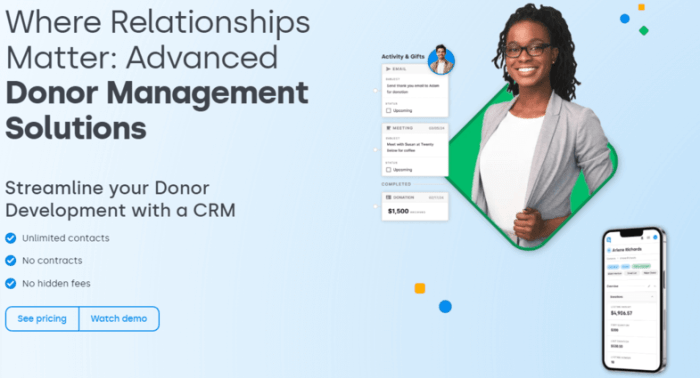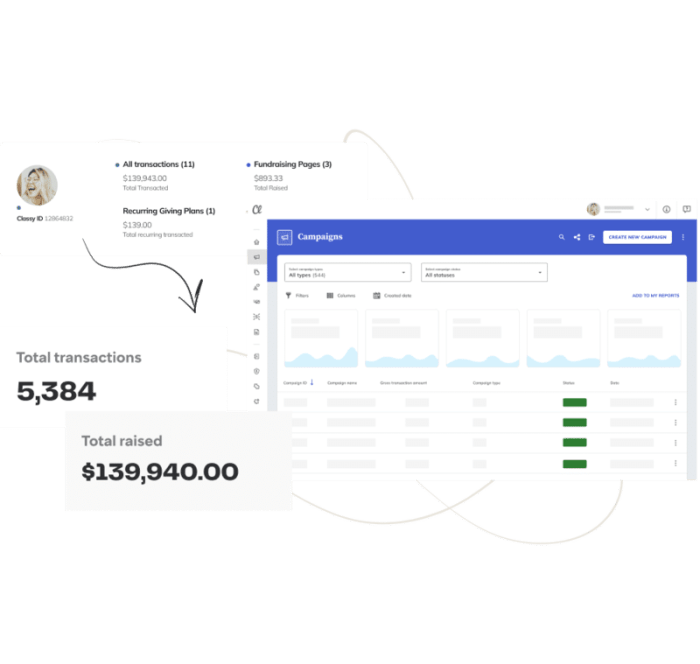Crm donor management software – In the ever-evolving landscape of non-profit organizations, efficient donor management is paramount. A robust donor management system, often referred to as CRM (Customer Relationship Management) for donors, is no longer a luxury but a necessity for maximizing fundraising efforts and fostering lasting relationships with supporters. This comprehensive guide delves into the intricacies of donor management software, exploring its features, benefits, and selection process to empower your organization to achieve its philanthropic goals.

Source: kindful.com
Understanding Donor Management Software (DMS)
Donor management software is a specialized CRM designed to streamline the entire donor lifecycle, from initial contact to ongoing engagement. It centralizes all donor information, interactions, and donation history, providing a holistic view of each individual’s relationship with your organization. This centralized system facilitates efficient communication, personalized outreach, and data-driven decision-making, ultimately leading to increased fundraising success and stronger donor relationships.
Key Features of Effective Donor Management Software:
- Contact Management: Store comprehensive donor profiles including contact details, donation history, communication preferences, and volunteer activities. This ensures consistent and personalized communication.
- Donation Tracking: Accurately record all donations, pledges, and payments, providing a clear picture of fundraising performance and individual donor contributions. Integration with payment gateways is crucial for seamless processing.
- Fundraising Campaign Management: Plan, execute, and track the progress of fundraising campaigns, analyzing their effectiveness and identifying areas for improvement. This often includes features for setting goals, managing timelines, and monitoring progress.
- Reporting and Analytics: Generate comprehensive reports on donor activity, fundraising performance, and campaign effectiveness. Data-driven insights inform strategic decisions and improve future fundraising strategies.
- Communication Management: Automate personalized communication through email marketing, direct mail, and other channels, ensuring timely and relevant engagement with donors. This may include features for A/B testing and segmentation.
- Volunteer Management: Track volunteer hours, skills, and assignments, streamlining volunteer coordination and maximizing their contribution to your organization’s mission. This feature is increasingly important for non-profits relying on volunteer support.
- Grant Management: Manage grant applications, reporting, and compliance requirements, ensuring timely submissions and efficient tracking of grant funding. This helps maintain transparency and accountability.
- Integration Capabilities: Seamlessly integrate with other systems such as accounting software, email marketing platforms, and payment gateways to optimize workflows and data consistency.
Benefits of Implementing Donor Management Software
Investing in a robust DMS offers numerous advantages for non-profit organizations of all sizes. These benefits extend beyond simple data organization and encompass significant improvements in operational efficiency and fundraising outcomes.
Improved Donor Relationships:
Personalized communication and targeted outreach foster stronger donor relationships, leading to increased loyalty and repeat donations. DMS enables you to segment your donor base and tailor messages to their specific interests and giving history.
Enhanced Fundraising Efficiency:
Streamlined processes, automated tasks, and data-driven insights significantly improve fundraising efficiency. This frees up staff time to focus on strategic initiatives and building relationships with donors.
Increased Fundraising Revenue:
By optimizing donor engagement and identifying high-potential donors, DMS contributes directly to increased fundraising revenue. Targeted campaigns and personalized appeals yield higher conversion rates.
Better Data Management and Reporting:
Centralized data storage and comprehensive reporting capabilities provide a clear picture of fundraising performance and donor behavior. This enables informed decision-making and continuous improvement.
Improved Compliance and Transparency:
Robust DMS solutions facilitate compliance with relevant regulations and ensure transparency in financial management. This builds trust with donors and strengthens the organization’s reputation.
Choosing the Right Donor Management Software
Selecting the appropriate DMS requires careful consideration of your organization’s specific needs and resources. Factors to consider include:
Budget:
DMS solutions range in price, from affordable cloud-based options to more expensive enterprise-level systems. Choose a solution that aligns with your budget and scalability needs.
Features:
Identify the essential features for your organization, prioritizing those that directly support your fundraising goals and operational efficiency.
Scalability:, Crm donor management software
Select a system that can grow with your organization, accommodating increasing data volume and user needs as your organization expands.
Integration Capabilities:
Ensure seamless integration with existing systems, such as accounting software and email marketing platforms, to avoid data silos and streamline workflows.

Source: kindful.com
Ease of Use:
Choose a user-friendly system that is easy to learn and navigate, minimizing training time and maximizing user adoption.
Customer Support:
Reliable customer support is essential for addressing any technical issues or questions that may arise. Look for vendors with responsive and helpful support teams.
Frequently Asked Questions (FAQ)
- Q: What is the difference between donor management software and a regular CRM? A: While both manage contacts, donor management software is specifically designed for non-profits, focusing on features like donation tracking, fundraising campaign management, and grant management, which are less critical in standard CRM applications.
- Q: How much does donor management software cost? A: Costs vary greatly depending on features, scalability, and vendor. Some offer tiered pricing based on the number of users or contacts, while others charge a fixed monthly or annual fee.
- Q: Is donor management software difficult to use? A: Most modern DMS solutions are designed with user-friendliness in mind. However, the learning curve may vary depending on the system’s complexity and your team’s technical proficiency. Look for systems with intuitive interfaces and robust training resources.
- Q: Can donor management software integrate with my existing accounting software? A: Many DMS solutions offer integration capabilities with popular accounting software packages. This ensures data consistency and streamlines financial reporting.
- Q: What are the key metrics to track with donor management software? A: Key metrics include donor acquisition cost, donor retention rate, average gift size, fundraising return on investment (ROI), and overall fundraising revenue.
Conclusion
Implementing a robust donor management software solution is a strategic investment that empowers non-profit organizations to enhance donor relationships, optimize fundraising efforts, and achieve their philanthropic goals. By carefully considering your organization’s specific needs and selecting the right software, you can unlock the full potential of your donor base and make a greater impact on your community.
Resources
Call to Action
Ready to transform your donor management and elevate your fundraising efforts? Explore the leading donor management software solutions today and discover how a streamlined system can empower your organization to achieve its mission. Contact us to learn more about selecting and implementing the right software for your needs!
Answers to Common Questions: Crm Donor Management Software
What is the cost of CRM donor management software?
Costs vary widely depending on the features, scalability, and vendor. Options range from affordable cloud-based solutions to more expensive enterprise-level systems.
How much training is required to use CRM donor management software?
Training needs vary depending on the software’s complexity and your organization’s technical expertise. Many vendors offer training resources, and some systems are designed for intuitive use with minimal training required.
Can CRM donor management software integrate with other systems?
Many CRM systems offer integration capabilities with other software, such as accounting systems and email marketing platforms. This integration can further streamline workflows and improve data management.
What security measures are in place to protect donor data?
Reputable vendors employ robust security measures, including data encryption, access controls, and regular security audits, to protect sensitive donor information. It’s crucial to choose a vendor with a strong commitment to data security.
